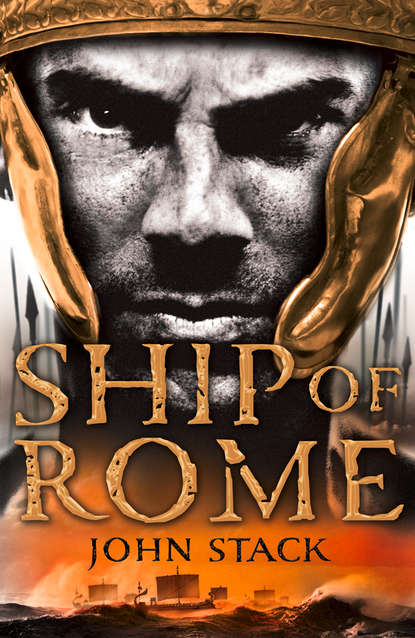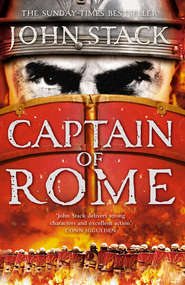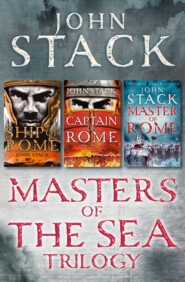По всем вопросам обращайтесь на: info@litportal.ru
(©) 2003-2024.
✖
Ship of Rome
Автор
Год написания книги
2019
Настройки чтения
Размер шрифта
Высота строк
Поля
He turned again to watch the Roman galley, the blood in his veins mixing with adrenaline as he sensed the approach of battle. It was now just a matter of time.
Atticus focused all his attention on the waters ahead, trying to read every nuance in the waves. His concentration was interrupted by the approach of a runner.
‘The second-in-command begs to report, Captain, one of the Carthaginians has broken formation and has moved alongside the lead ship.’
Atticus kept his eyes on the waters ahead. The water was calm, the rock still two thousand yards distant. He had time. His orders to Lucius could not be trusted to a runner, he needed to speak to him in person. He double-checked the waters off the bow again and then turned and ran down the length of the ship to the aft-deck. Lucius was staring through a chink in the shield wall to the galleys behind.
‘Report, Lucius,’ Atticus said.
The second-in-command turned and straightened. ‘Just as we expected, Captain, one of the Carthaginians has broken off and has just increased to attack speed. She’s already closing the gap. The other two have taken up flanking positions on her starboard and port aft-quarters, but they are maintaining battle speed.’
Atticus brushed past Lucius to look through the shield wall to see for himself. The three Carthaginian galleys were in arrow formation as before, but now the lead ship was outpacing the other two.
‘Lucius, let him come to within one hundred yards and then let fly. Attack speed. Match him stroke for stroke. He’s nothing to lose so he’ll push us hard. He’ll keep pace for a few minutes then he’ll push to ramming speed. Hopefully we’ll reach Charybdis before that. When we do I’ll signal for ramming speed, then for the oars. We want him off guard, so keep them close. We can’t allow them time to react.’
Lucius nodded. ‘Understood, Captain, I’ll watch for your signal.’
Atticus reached out and clasped his second-in-command on the shoulder, feeling the calm strength there, trusting him. ‘See you beyond Charybdis,’ he said.
‘Or in Elysium,’ Lucius replied with a smile.
Septimus had watched Atticus outline his orders to Lucius without comment. He did not understand the strategy that Atticus was dictating, although the captain had been right about the Carthaginians. They were sacrificing one ship to wear down the Aquila, to leave her helpless, unable to even limp away at standard speed. The captain turned and ran once again to take up position on the foredeck. Lucius returned to looking through the shield wall at the approaching galley, the marines holding their scuta in place grimly as arrow after arrow struck their protective wall. Septimus stood beside the second-in-command.
‘Lucius, what are Scylla and Charybdis, the rock and the whirlpool?’
‘Scylla is the rock and Charybdis is the whirlpool,’ Lucius replied, never taking his eyes off their pursuer. ‘The ancients believed that both were once beautiful sea nymphs who displeased the gods and were punished. Scylla was transformed into a rock that reaches out into the sea to claw at passing ships, and Charybdis into a whirlpool that would swallow ships whole as they tried to avoid Scylla.’
Lucius paused, judging the distance before bellowing down to the slave deck, ‘Drum master! Attack speed!’
Septimus could hear the drum master repeat the order to the two hundred sweating slaves as their pace increased perceptibly, the Aquila instantly responding. Lucius looked through the shield wall again and grunted his approval before continuing as if he had only paused for breath.
‘Any ship that doesn’t know the strait – and we’re counting on the fact that the Carthaginians don’t – may find herself running along the Sicilian coastline. On this side of the strait you have to run between Scylla and Charybdis, between the rock and the whirlpool.’
Karalis thought for a moment that the Roman ship would not react, perhaps resigned to her fate, or perhaps wanting to fight and die with honour rather than run. Maybe he would get the chance to bloody his sword after all. Karalis was Sardinian by birth, as were most of his crew, and although he respected the strength of his country’s Phoenician masters, he despised their condescension. He fully understood the admiral’s strategy, but this did not assuage his anger, as he knew it was because he was Sardinian that his ship had been chosen to be sacrificed. Just as a smile began to creep onto his face, as he relished the idea of robbing the Carthaginians of first blood, the Roman craft responded, increasing to attack speed. The captain cursed. The Sidon was still one hundred yards short of the Roman ship. He would never catch her now. Even from his initial vantage point at the rear of the vanguard, he could see that the Roman trireme was a faster, sleeker ship than his own. He estimated that she was at least two knots faster, which meant his rowers had to worker harder to keep pace. None of that mattered though, he thought. Even the best galley slaves could not maintain attack speed for longer than fifteen minutes. At ramming speed they would collapse after five. The captain would follow orders. He would keep the pace unrelenting. He would push his slaves past exhaustion, past endurance. They would tear the heart out of the Roman galley slaves, and then both ships, Sardinian and Roman, would stop – the Sardinians to rest, the Romans to die.
Atticus wiped the spray from his face as he refocused his eyes on the sea ahead. The Aquila was now making eleven knots, her attack speed. He stuck out his right arm, a signal to Gaius to make another minor adjustment to the ship’s course, keeping her just right of Scylla, the rock. Atticus estimated that they had increased speed some ten minutes ago. He knew the measure of his slave crew, knew their worth, and knew that by now they were reaching their limits. Once again he swept the sea before him with his eyes.
‘There!’ he shouted to himself. ‘There she is…dead ahead, eighty yards!’
He quickly turned and looked back the sixty yards to the aft-deck. Lucius was staring directly at him. ‘Now, Lucius!’ he shouted, and pumped his fist in the air, the prearranged signal.
Lucius’s order carried clearly along the length of the ship:
‘Ramming speed!’
Karalis glanced at the two Carthaginian galleys one hundred yards behind him. They were drawing further behind with every stroke the Sidon took, although the captain knew that once the Roman vessel was stationary, the Carthaginians would be upon her within a minute. He walked quickly back along the deck to the steps leading down into the slave decks below. The drum master was seated at the foot of the steps, keeping the rhythm a notch above attack speed in order to match the Roman trireme. It had been ten minutes; time to increase to ramming speed. Even though he knew his ship would miss the action of the final kill, he could sense the blood rushing through his veins in anticipation of this final part of the chase. He had never continued on ramming speed past two minutes. Normally that was all that was required to bring his galley to its top speed of twelve knots, enough speed to drive the bronze ram of the Sidon through the heaviest timbers.
‘Drum master, ram—’ His words were cut short by the sight of the Roman trireme increasing her pace to her top speed. He hesitated for a second, perplexed, then gathered his wits: ‘Ramming speed, drum master, ramming speed!’
Karalis ran to the foredeck to confirm what he saw. At only one hundred yards’ distance the Roman galley filled his field of vision. She was drawing ahead slightly, her faster lines giving her the advantage at top speed. Karalis was dumbstruck. Why by the gods would the Romans increase speed unprovoked? Surely once she went to top speed her rowers would only last mere minutes? The captain of the Sidon was still trying to understand the Romans’ lunacy when suddenly, within one stroke, all two hundred oars of the Roman trireme were raised clean out of the water.
At ramming speed the bow of the Aquila tore through the water at thirteen knots, the drum master pounding eighty beats a minute, forty strokes for each of the trireme’s two hundred oars. Atticus leaned forward over the bow rail, measuring the distance between the Aquila and the rim of the whirlpool ahead. He stuck out his right hand again for a minor course adjustment, the ship responding instantly to Gaius’s expert touch on the tiller sixty yards behind. He dropped his arm and the ship steadied on its final course, one that would take the galley to the very edge of oblivion, the gaping maw of Charybdis. Atticus afforded himself a brief look over his shoulder to the pursuing enemy galley. The shield wall was obscuring his vision; however, he could tell by the line of her oars that she was matching their course adjustments, point for point, wary that her prey might suddenly make a drastic course change in a bid to escape. He turned to the bow again, refocusing all his attention on the point where the Aquila would skim the edge of the whirlpool, now forty yards away…now thirty…twenty…
He had to be exact. Too soon and the ship would not have enough momentum for steerage; too late and the starboard rowers would fall victim to the currents of Charybdis.
It was now, the moment was now, the bow of the Aquila was ten yards short, Charybdis was upon them. He spun around, looking for Lucius, finding him riveted to his post on the aft-deck. Their eyes locked.
‘Now, Lucius!’ he roared.
Lucius responded, ‘Drum master, raise oars!’
The order was instantly repeated below in the slave decks. The drum beat stopped. The slaves threw themselves forward, pivoting their oars, lifting the blades clear out of the water.
The Aquila sped on, at first her speed checking imperceptibly. Atticus sprinted the length of the galley to the aft-deck, barely registering the terrified faces of many of the marines who had never witnessed the fury of Charybdis. To his left the churning waters of the whirlpool were speeding past the Aquila, only six feet from the hull, running counter to the direction of the trireme but not hindering her progress.
Gaius stood immovable at the rudder, his gaze steely as he sought to keep the tiller straight along the axis of the ship, the true course of the Aquila vital if she was to avoid becoming the victim of her own trap. The captain took up station beside him, his hand resting lightly on the tiller, searching for a telltale tremor that would betray any pressure on the rudder’s blade.
Atticus saw Gaius’s reaction a heartbeat before the minute tremor under his hand confirmed the helmsman’s incredible reflexes and he gripped the tiller tightly. Beneath the Aquila an unseen tentacle of current, too weak to attack the seventy-ton hull, was building against the rudder, threatening to force the blade off true. Within seconds the pressure had multiplied tenfold and the muscles in both men’s arms were tensed and flexed as they struggled to keep the tiller aligned.
Time slowed as Atticus’s mind counted the seconds it would take to sail past the whirlpool. Beside him Gaius’s face was mottled from exertion while beneath him speed bled from his galley as the enemy closed in. The sound of Lucius’s voice filled the air, sounding the ever-decreasing gap between the two galleys. ‘Seventy yards…! Sixty yards!’ and all around him the faces of the crew were frantic as they witnessed the struggle of their captain and helmsman. Underneath it all, Atticus felt the rudder shift slightly under his hand and for an instant a panic flared in his heart that he had cut his course too close to the vortex.
Hold your course, Aquila, his mind roared, trying to connect his will to the ship.
Almost within an instant the pressure on the rudder was released, and Atticus knew the Aquila was through, the waters around her hull becoming calm once more as the whirlpool fell off her starboard stern quarter. He spun around to his second-in-command.
‘Lucius, prepare to get under way. Get below decks, have all the reserves assigned plus any additional crew available. Do whatever’s required, but I need attack speed immediately.’
‘Yes, Captain,’ he replied, and was instantly away.
Atticus moved to the stern rail to watch his pursuers. Now, he grinned with satisfaction, the Carthaginians would feel the wrath of Charybdis.
The Sidon cut through the water at twelve knots, closing the gap on the Roman trireme by ten yards every five seconds. Karalis had wavered for an instant, unable to comprehend the Roman captain’s actions, before his years of command experience took over. He realized they would be upon the Roman ship within a minute. Karalis shrugged his questions aside and began issuing orders to his assembled crew.
‘Prepare for impact! Assemble the boarding party!’ They would ram the Roman galley through her stern, a killing blow, taking her rudder and holing her below the waterline. While the Romans were recovering, his boarding party would spill over the stern rail, killing the senior officers who would be stationed there. He would lead his men personally, they would spare no one, and when his ship finally disengaged, tearing her bronze ram from the hull, the Roman trireme would drag her chained slaves beneath the waves.
The gap was down to fifty yards when the Roman vessel re-engaged her oars. You’re too late, fool, the captain thought. The Sidon was at the point where the Roman crew had inexplicably raised oars. He would be upon them within fifteen seconds.
On the slave deck of the Sidon, the galley slaves were oblivious to the action above decks. Chained to his oar, each of the two hundred men was enclosed within his own private hell. For many of them, years at the oar had brutalized them and they worked in silence, their whole world focused on the constant rhythm of their oar-stroke, the backbreaking pull, the quick release to bring the oar forward, a second’s respite, the muscles straining again through the next pull. Sweat poured to mingle with fresh blood raised by the taskmaster’s lash across their backs, as man after man collapsed in exhaustion, to be savagely beaten where he fell as a reserve took his place, the unrelenting pace never abating.
The thirty rowers of the starboard fore section of the Sidon were the first to strike Charybdis. Not six feet from where they stood, on the other side of the hull, the current of the whirlpool sped past them at twenty knots. Keeping to the beat of the drum master, the rowers brought their oars forward and stuck their blades into the water in unison. Instantly the oars were ripped from their fingers as the current took hold of the blades and pushed the oars parallel to the hull. The slaves on the lower two rows screamed in agony as the oars of the upper row, fifteen foot long and fifty pounds in weight, spun on their mountings and slammed into them, killing many instantly. Within the instant marked by the drum master’s beat, the second section of thirty rowers endured the same fate, fuelling the destruction of the slave deck. The starboard side was in chaos, a mayhem of broken men. The port side never missed a beat, the rowers continuing at full tilt, completing the trap.
The air around Karalis was split by the sound of shattering timbers and cries of pain from the slave decks below him, and the Sidon heeled violently as momentum was lost on the starboard side. He ran to the starboard rail in time to see the second section of oars collapse against the hull, the air again ripped by the sound of his ship and her rowers being destroyed beneath him.
‘By the gods,’ he whispered as he saw the cause, fear coursing through him.
The ship heeled further to the right as the left-side oars continued their stroke, pushing the bronze ram into the current of the whirlpool. The Sidon was gripped as if by the hands of a god and whipped around to starboard, throwing Karalis and those around him to the deck. The archers stationed on the foredeck were thrown into the maelstrom of the whirlpool, their cries cut off as they were sucked beneath the tortured waters.
Karalis looked frantically towards the aft-deck, praying for respite but finding none. The helmsman was dead, his chest staved in where the tiller had struck him a killing blow. The Sidon was out of control.









